Here’s the Jane Austen Character You’d Be, Based On Your Myers-Briggs® Personality Type
Like many classic book lovers, I’ve always had a soft spot in my heart for Jane Austen. A world-renowned English novelist, Austen completed only six works during her short lifetime, but those works are still relevant and popular today! Austen’s books are renowned for their wit, social commentary, and exploration of the human experience. Through her beloved characters, readers can immerse themselves in a world that speaks to them on an individual level. Growing up, I loved Sense and Sensibility and Pride and Prejudice and still love them today. With that in mind, I thought it would be exciting to explore which Jane Austen character you would be based on your Myers-Briggs personality type.
Let’s get started!
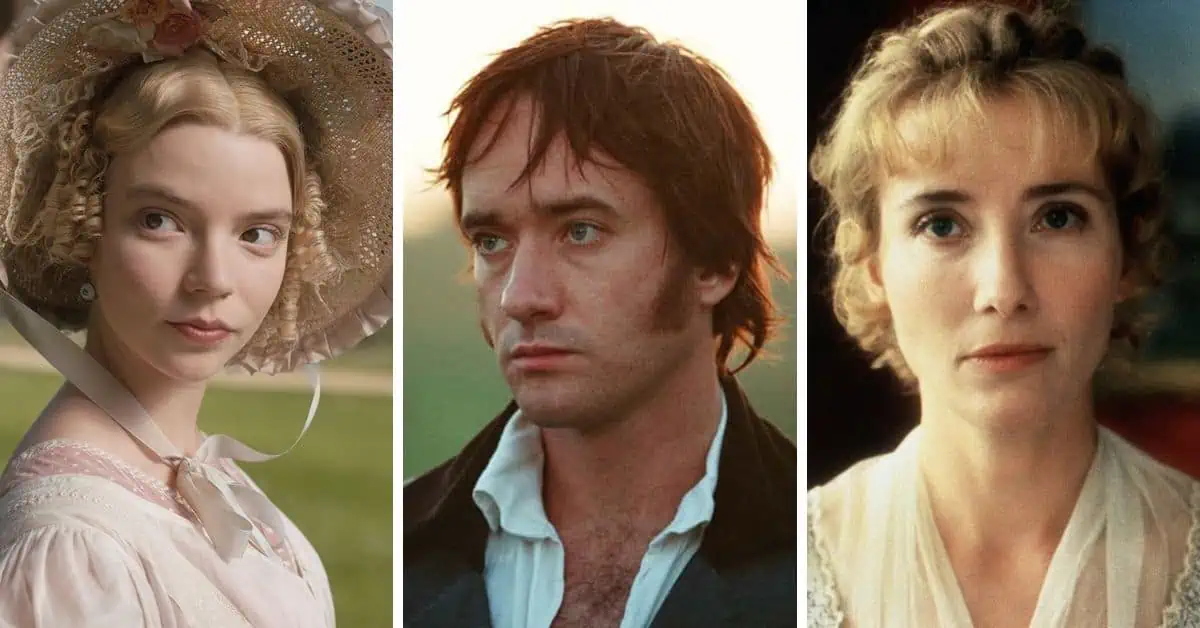
Not sure what your personality type is? Take our new personality questionnaire here. Or you can take the official Myers-Briggs Type Indicator (MBTI®) here.
Here’s the Jane Austen Character You’d Be, Based On Your Myers-Briggs® Personality Type
INTJ – Fitzwilliam Darcy (Pride and Prejudice)
“I have faults enough, but they are not, I hope, of understanding. My temper I dare not vouch for. It is, I believe, too little yielding; certainly too little for the convenience of the world. . . . My good opinion once lost is lost for ever.”– Fitzwilliam Darcy
Independent and intelligent, Fitzwilliam Darcy is the mysterious, wealthy hero of Jane Austen’s Pride and Prejudice. Initially he appears snobbish, classist, and distant, however; through the novel, his character develops and he reveals a more tender, sensitive side. Like most INTJs, Darcy trusts his insights very quickly. He quietly judges the outer world and lets others make fools of themselves with their mindless chatter. His introversion is apparent in his detached, analytical nature. And like many INTJs, he doesn’t respect social conventions as much as other types are apt to. He refuses to dance at the ball with strangers and states his mind even when it is not socially tactful to do so. Yet even though Mr. Darcy can appear unfeeling and aloof, he has a deeply sensitive heart and shows his love in the places he puts his resources and in the loyalties he chooses.
Find out more about INTJs: 24 Signs That You’re an INTJ, the Strategist Personality Type
INFJ – Elizabeth Bennet (Pride and Prejudice)
“There is a stubbornness about me that never can bear to be frightened at the will of others. My courage always rises at every attempt to intimidate me.” – Elizabeth Bennet
Elizabeth Bennet is the center of Pride and Prejudice, and an INFJ through and through. She strives to maintain her autonomy in a world where women are not viewed as equal partners. Her independence and strength of character inspire many people around her, including Mr. Darcy who is drawn to her insight and independence. Elizabeth is an idealist with deeply held personal beliefs that she does not compromise. She is averse to superficiality and hates when people are polite but insincere in their conversations. Quiet but emotionally intelligent, she notices the feelings of others and is typically kind-hearted and friendly. However, like most FJs, she is especially turned off by rudeness and can judge someone’s character harshly if they don’t meet her standards for friendliness.
Find out more about INFJs: 3 Weird and Wonderful Secrets About the INFJ Personality Type
ENFJ – Emma Woodhouse (Emma)
“A woman is not to marry a man merely because she is asked, or because he is attached to her, and can write a tolerable letter.” – Emma Woodhouse
Emma Woodhouse is the precocious and likable heroine from Jane Austen’s fourth novel. She’s an ENFJ who enjoys playing matchmaker (for better or worse) and bringing joy to the lives of those around her. Emma is a natural leader who loves to take charge of situations and use her insights about people in order to help them find their way (or their new love). She’s quite persuasive, charmingly winning over even the most stubborn individuals. ENFJs like Emma are typically warm and friendly, with strong interpersonal skills; yet, like Emma, average to unhealthy ENFJs can exert so much energy in the affairs of others that they forget to introspect, leading to rash decisions.
Find out more about ENFJs: The ENFJ Personality Type and the Enneagram
ENTJ – A blend of Fitzwilliam Darcy and George Knightley
Okay, friends. I have scoured every single Jane Austen book trying in vain to find a good ENTJ character. There simply aren’t any (but if you’ve found one, please, by all means, let me know!). I’ve had a few people try to convince me that Lady Susan is an ENTJ, but she’s a character that I believe has BPD and thus is hard to really profile effectively. Because of this, I’m having to add this admittedly odd amalgamation.
If Fitzwilliam Darcy and George Knightley merged into a single individual then that individual would look something like an ENTJ. Both of these characters share some elements of an ENTJ: a logical perspective and insight into complex situations. They also both have the problem solving powers that many ENTJs possess, although George’s may be slightly more driven by his down-to-earth, sensing side while Mr. Darcy is an intuitive. Darcy is introverted (an INTJ) and keeps his true thoughts much more guarded than an ENTJ. ENTJs are apt to speak their minds quite freely. Yet, like Mr. Darcy, ENTJs long for understanding, mastery, and control. George Knightley is more forthcoming, so if you could “sprinkle in” a little Knightley, that would look more akin to an ENTJ. ENTJs are known for their hard-working nature, and Knightley embodies this well. He can be sharp of tongue (like all ETJs can be), but his heart and his devotion to his friends is unwavering.
ISTJ – Elinor Dashwood (Sense and Sensibility)
“It is not everyone,′ said Elinor, ‘who has your passion for dead leaves.”
Sensible and kind-hearted, Elinor Dashwood is an ISTJ from Jane Austen’s Sense and Sensibility. She is known for her level-headedness, practicality, and steadfast loyalty to her family. Elinor is the oldest daughter of the Dashwood family and takes it upon herself to look after her sisters in their time of need. ISTJs like Elinor are typically responsible and dependable; they are the ones who can be counted on to manage logistics even when life gets stormy and unpredictable. Elinor is an excellent problem-solver, often helping her friends and family with clever solutions for their dilemmas, financial or otherwise. She has a strong sense of morality and justice – but also knows when to temper her strict standards in order to accommodate others. Her quiet strength and unwavering loyalty make her a beloved heroine among Austen fans.
Find out more about ISTJs: Are ISTJs Rare? A Look at the Detective Personality Type
ISFJ – Jane Bennet (Pride and Prejudice)
“He is just what a young man ought to be, sensible, good-humoured, lively; and I never saw such happy manners! He is also handsome, which a young man ought likewise to be.” – Jane Bennet
Jane Bennet is the oldest and most beautiful of the Bennet daughters; known for her kindness, modesty, and tendency to see only the good in people. Her younger sister, Elizabeth states, “Oh! you are a great deal too apt, you know, to like people in general. You never see a fault in anybody. All the world are good and agreeable in your eyes. I never heard you speak ill of a human being in your life.” Jane’s open-minded, gentle view of the world is characteristic of ISFJs, particularly ISFJs with a Nine Enneagram type. Like Jane, ISFJs tend to be a bit reserved but thoughtful. They don’t speak their mind off-the-bat, but instead ruminate on their thoughts and feelings before voicing them (as tactfully as possible). ISFJs are also often very loyal – Jane’s loyalty to her family is seen in how she never speaks ill of them, even when they make mistakes. She has a strong sense of duty and responsibility and always puts the needs of her loved ones first.
Find out more about ISFJs: The Flirting Styles of the ISFJ Personality Type
ESFJ – Isabella Thorpe (Northanger Abbey)
“There is nothing I would not do for those who are really my friends. I have no notion of loving people by halves; it is not my nature. My attachments are always excessively strong.” – Isabella Thorpe
Isabella Thorpe is a character from Jane Austen’s novel Northanger Abbey. As an ESFJ she’s a social chameleon who knows how to make anyone feel like her best friend or closest confidante. Isabella loves to make connections and spends her time talking with those around her, gathering information and making observations. Down-to-earth but excitable, she loves to dance, shop, giggle, and flirt. She loves to be the center of attention and is extremely expressive with her feelings, connecting with others through shared values and harmonious gestures. While Isabella displays some characteristics of an unhealthy ESFJ (she can be manipulative and passive-aggressive) she also has the intelligence about interpersonal dynamics that makes ESFJs shine.
ESTJ – George Knightley (Emma)
“Men of sense, whatever you may choose to say, do not want silly wives.” – George Knightley
Many people think of ESTJs as a bunch of brusque, insensitive jerks. I’m happy to announce here that George Knightley is a healthy and admirable example of the ESTJ type. He has the objectivity, sensibility, and clear-headedness common to ESTJ personalities. But he also has the backbone of Introverted Feeling that gives him a moral understanding of his own motivations, and the motivations of others. He is the voice of reason in the novel, always ready with wise advice and a steady hand when his friends (especially Emma) are prone to letting their emotions run wild. As an ESTJ, George knows how important it is to keep his composure and make sensible decisions; he values order and structure in his life as well as in others’. He is a loyal and dependable friend, always willing to listen and offer wise counsel.
Find out more about ESTJs: 10 Things You Should Never Say to an ESTJ
INTP – Mr. Bennet (Pride and Prejudice)
“For what do we live, but to make sport for our neighbors, and laugh at them in our turn?” – Mr. Bennet
The taciturn and sometimes cynical Mr. Bennet from Pride and Prejudice is an INTP with a dry wit to match his personality type. He prefers his alone time, but is often roped into social engagements by his headstrong wife, Mrs. Bennet. INTPs like Mr. Bennet spend much of their time analyzing and questioning the world around them; he is a lover of books and learning, but also has a strong sense of irony and appreciate sarcasm in others (as well as in himself). Mr. Bennet displays many traits common to INTPs – his intelligence, his ambition for knowledge, and his laid-back approach to life. He has a certain scorn for society’s conventions and often mocks his wife’s ceaseless desire to find matches for their daughters. Yet despite his aloofness, Mr. Bennet cares deeply for his daughters and tries his best to do right by them.
Find out more about INTPs: 10 Things You Should Never Say to an INTP
INFP – Fanny Price (Mansfield Park)
“I cannot think well of a man who sports with any woman’s feelings; and there may often be a great deal more suffered than a stander-by can judge of.” – Fanny Price
Fanny Price is a character from Jane Austen’s third novel, Mansfield Park. Price is an INFP with a sensitive soul and a deep-seated sense of morality and justice. She tends to keep to herself and is painfully shy, but she doesn’t change herself for others and strives to be true to what she believes is right. Above all, she enjoys writing and spends hours creating witty stories and sarcastic, astute observations about the people in her society. INFPs like Fanny are quiet and contemplative but also have a deep passion for justice and fairness – they often become fixated on one idea or cause that they may devote their lives to defending and advocating for it.
Find out more about INFPs: 26 Memes INFPs Will Relate To
ENTP – Henry Tilney (Northanger Abbey)
“I should no more lay it down as a general rule that women write better letters than men, than that they sing better duets, or draw better landscapes. In every power, of which taste is the foundation, excellence is pretty fairly divided between the sexes.” – Henry Tilney
Henry Tilney is a character from Jane Austen’s first novel, Northanger Abbey. He is an ENTP who loves to ponder bigger questions and debate his ideas with others. He enjoys talking, analyzing, and teasing. ENTPs are driven by possibility and analysis, and Henry displays this through his banter, creativity, and sometimes unconventional tastes. Henry also has a great deal of energy and enthusiasm for life which he shares with those around him through his wit and charm. His natural curiosity drives him to explore new ideas constantly, and he is always looking for opportunities to learn something new or challenge the status quo. Like most ENTPs, Henry has a great deal of confidence in his own insights which he communicates through passionate debates and quick, witty remarks.
Find out more about ENTPs: The Top 7 Gift Ideas for ENTPs
ENFP – Marianne Dashwood (Sense and Sensibility)
“Money can only give happiness where there is nothing else to give it.” – Marianne Dashwood
Marianne Dashwood is the passionate, fiery protagonist of Sense and Sensibility. She’s an ENFP through and through – filled to the brim with imagination and following her emotions wherever they may lead. Marianne loves with an intensity that only other ENFPs can understand; she sees the beauty in everything around her and seeks out opportunity to share it. She’s a risk-taker who loves pushing the boundaries and testing her limits. While she’s independent and strong-willed, Marianne is also deeply sensitive and can be hurt easily when her feelings are not respected or understood. ENFPs like Marianne are often drawn to aesthetics (music, art, theater) as well as creative writing and inventive problem solving – all things that Marianne excels at.
Find out more about ENFPs: 10 Things that Terrify ENFPs
ISTP – Margaret Dashwood (Sense and Sensibility)
Elinor Dashwood: You will inherit your fortune. We cannot even earn ours.
Edward Ferrars: Perhaps Margaret is right.
Elinor Dashwood: Right?
Edward Ferrars: Piracy is our only option.
I’m cheating a little with this character. I cannot find any clear ISTP characters in Jane Austen’s books, but in the 1995 movie depiction of Sense and Sensibility I could see the young Margaret Dashwood representing the type well. This Margaret keeps to herself, loves exploring, planning adventures, and absorbing facts like a sponge. She has a wry sense of humor and takes to people who can teach her new things about the world. Margaret also has an analytical, blunt streak that many ISTPs share; she speaks the truth even if it might ruffle some feathers. She loves adventure and has an independent spirit, but is also very loyal to her family.
Find out more about ISTPs: Understanding ISTP “Laziness”
ISFP – Augusta Markham (Sanditon)
“I see little point in vexing myself over something which did not happen.” – Augusta Markham
Okay, I had to cheat a little for our ISFP character. I couldn’t find an ISFP in any of Austen’s actual novels, so I did find an ISFP in the TV-miniseries inspired by Austen’s novel, Sanditon. Angela Markham is an ISFP who values her independence and trusts her instincts and emotions above all else. Like most ISFPs, she adores sensory experiences – she loves going for long walks in nature, playing the piano, and trying on clothes. Augusta has a deep love of life and all its wonders; she loves exploring new places and following her heart on a whim. And like most Introverted Feeling types, she’s a strong judge of character and can sense how people are feeling without having to be explicitly told.
ESTP – Mary Crawford (Mansfield Park)
“I am very strong. Nothing ever fatigues me but doing what I do not like.” – Mary Crawford
Mary Crawford is a character from Jane Austen’s Mansfield Park. As an ESTP, she has a thirst for adventure and takes pleasure in pushing the boundaries of what is socially acceptable. Whether she’s making off-color puns about men in the navy or gallivanting around the countryside with her brother, she’s always looking for ways to entertain herself. ESTPs like Mary are often outgoing and active; they prefer action over words and can be seen as impulsive or reckless by those who don’t understand them. Mary also has a strong sense of practicality which is typical of ESTPs – she can see the facts of a” situation and make decisions quickly, without being bogged down by emotion. Despite her outwardly confident demeanor, Mary has a strong sense of vulnerability which she tries to mask with humor. She is often charming and charismatic – able to win people over with her wit and enthusiasm for life.
Find out more about ESTPs: 10 Signs of an Unhealthy ESTP
ESFP – Lydia Bennet (Pride and Prejudice)
“What a good joke it will be!” – Lydia Bennet
Impulsive, fun-loving, and free-spirited, Lydia Bennet characterizes a fairly unhealthy version of the ESFP personality type. She is the youngest of the five Bennet sisters, and is known for acting without thought or caution. Lydia is always looking for fun and excitement; she loves gossiping with her friends, shopping for new clothes, and flirting with any handsome officer she can find. ESFPs like Lydia are known for their keen eye for beauty, and willingness to take risks – both in life and love. Lydia is often seen as careless and irresponsible by her family (particularly Elizabeth) due to her impulsiveness; she tends to act without considering the consequences of her actions. Despite this, Lydia has a good heart and loves deeply when given the chance; she just needs someone with the patience and understanding to bring out her best qualities.
Find out more about ESFPs: 10 Things ESFPs Look for in a Relationship
What Are Your Thoughts?
Did you agree with this article? Do you have any thoughts or insights to share from your own experience? Let us know in the comments!
Discover more about your personality type in our eBooks, Discovering You: Unlocking the Power of Personality Type, The INFJ – Understanding the Mystic, The INTJ – Understanding the Strategist, and The INFP – Understanding the Dreamer. You can also connect with me via Facebook, Instagram, or Twitter!


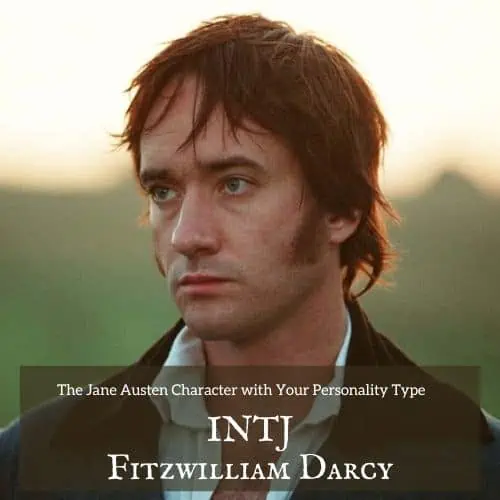
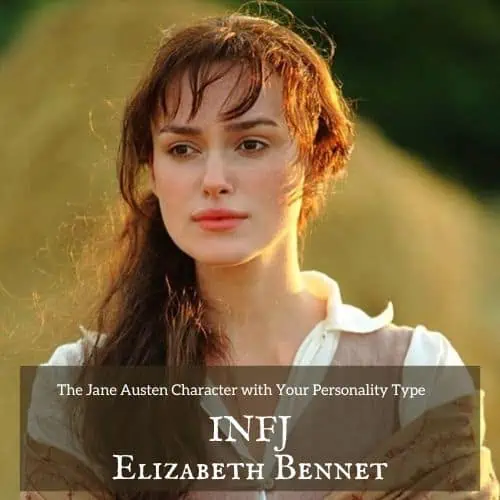
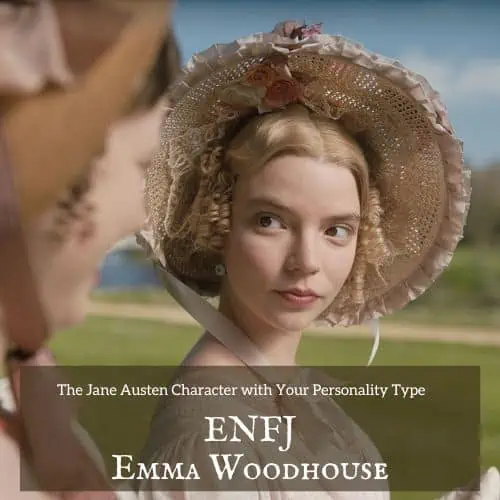
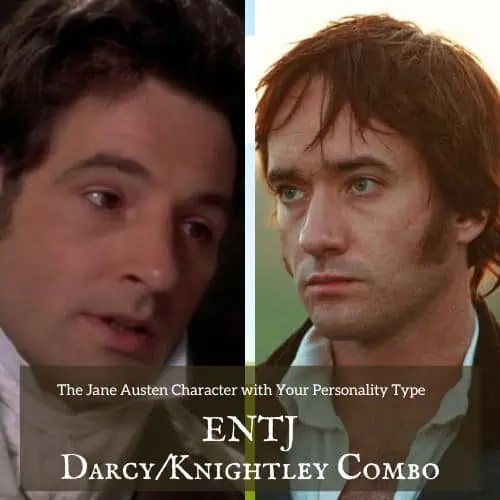
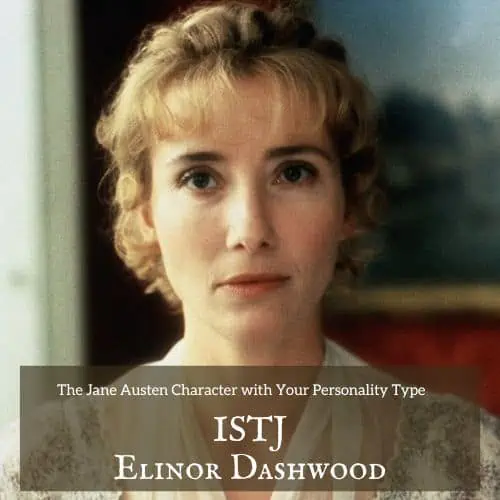
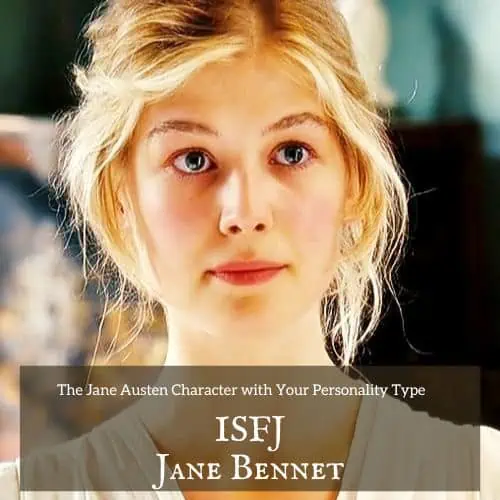
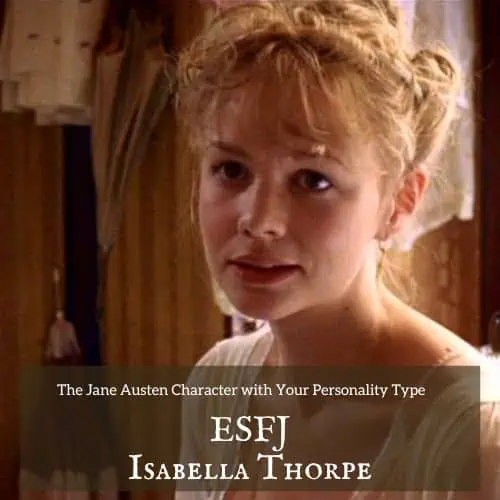
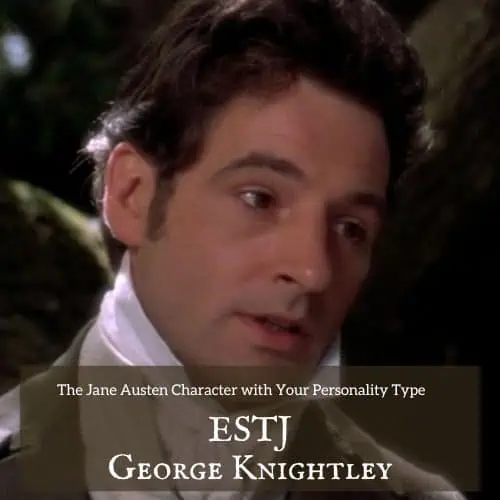
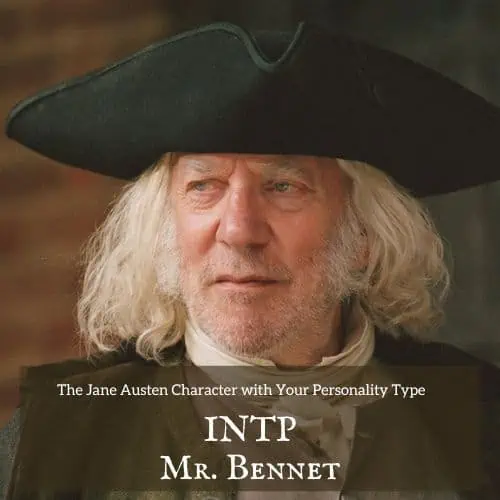
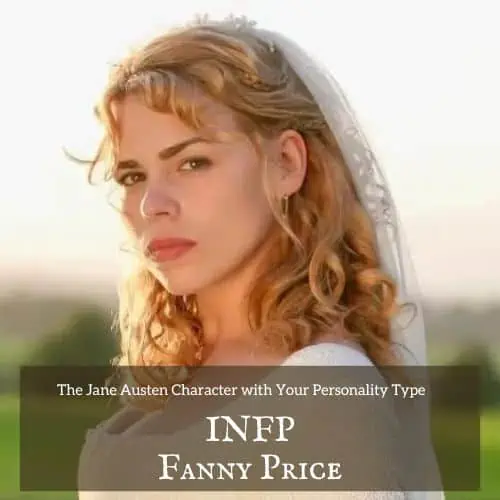
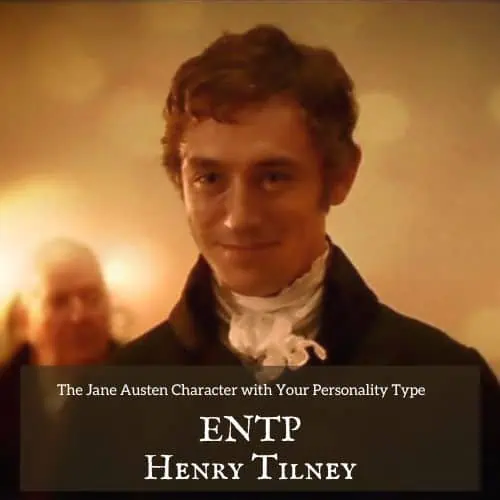
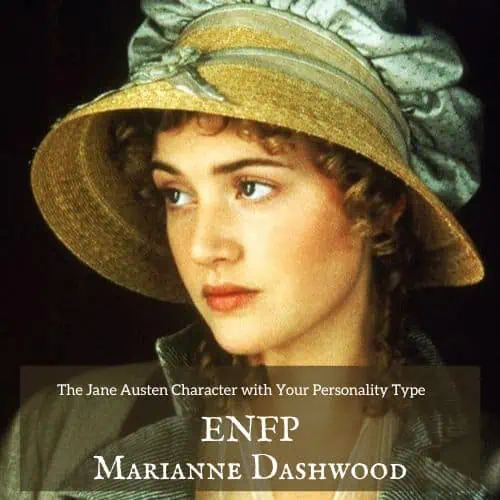
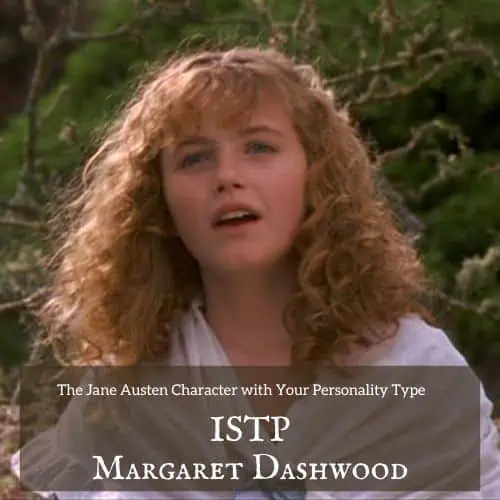
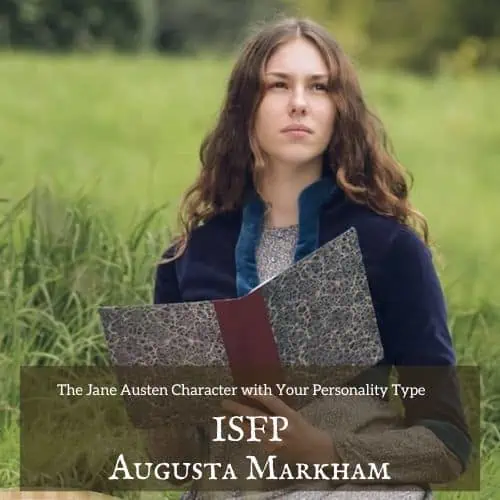
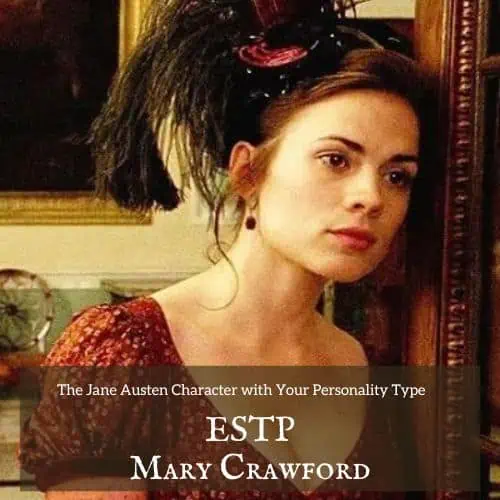
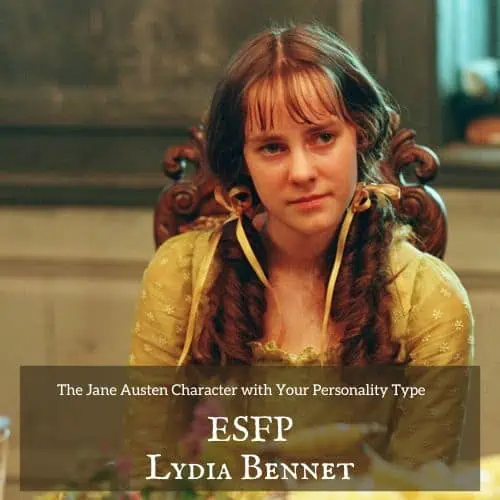







I’m pretty sure Catherine Morland(Northanger Abbey) is an ISFP. I know the whole nose-stuck-in-a-book part might be reminiscent of an INFP, but otherwise she seems pretty present to me. I think the movie makes her more of a dreamer than in the book(though there is the whole imagining General Tilney’s “dark secret” thing.)
Also, fairly certain General Tilney is an ENTJ, albeit a very unpleasant one.
I’m going to chew on the ISTP question. I’m sure Jane has one squirreled away somewhere.
Maybe Mr. Palmer in Sense and Sensibility? Pretty minor character, though.
Nobody from Persuasion. Maybe the missing ISTP lurks there.
Ahem. [eyebrows raised] Your Darcy pull-quote was spoken by Elizabeth. Also, I find myself sonewhat baffled by your choice of photo, as it does not appear to be Colin Firth.
Darcy is more like an ISTJ while Elizabeth Bennett is ENFJ.
I knew when I saw this that I would likely be Mr. Darcy! This was an interesting read especially since my husband is an ENTJ!
I always thought Elizabeth Bennett would be an INFP rather than an INFJ. I’m an INFP myself, but consider myself well-rounded; your INFJ description fits me to a T. I will say that I don’t generally criticize someone I don’t know (sugar-coating is a habit I’ve picked up from working 8 years in customer service-type roles), but idealism, uncompromising personal beliefs, desire for autonomy and independence, disdain for superficiality, emotional intelligence, deep empathy, intense hatred for rudeness, and quick judgements of people are all things that also fit the INFP personality.
Lizzy also keeps her opinions largely to herself, though she does share them with her family and Charlotte Lucas, and does not explode at Darcy until he proposes marriage out of the blue.
Maybe I’m not a stereotypical INFP, but I always saw myself in Lizzy more than any other character in Jane Austen’s books…
But what about Mr. Collins? I must know!
And I’ll just stir the pot and say I think Elizabeth is an ENTP. No, not a classically quirky ENTP like Henry Tilney( sigh… my high school book crush. Northanger Abbey was the first Austen book I ever read), but I think it’s still her best fit.
Ok, chewed on it long enough. Listening(again) to an audio book of Persuasion.( Yay Librivox!) I’m pretty sure that Frederick Wentworth is an ISTP.
Also, if you want a nicer ESTP than Mary Crawford, there’s always Admiral Croft. The Crofts are probably my favorite Austen couple. But he’s not as significant a character to Persuasion as Mary Crawford is in Mansfield Park.
Annnd, since I’ve already given my opinion that Lizzie isn’t an INFJ, I’ll mention that I think Anne Eliot is.